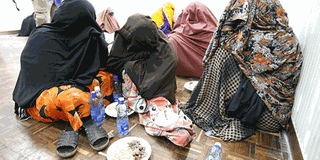Court defends Lenku on transfer of refugees

Some of the women who were arrested during a swoop on illegal immigrants in Eastleigh on April 9, 2014. PHOTO | EVANS HABIL
The High Court has defended Interior Cabinet secretary Joseph Ole Lenku’s directive to close refugee camps in urban centres and instructing refugees to go to designated camps.
Justice David Majanja, while dismissing a petition filed by 500 Eastleigh traders, said the minister had the powers to issue the notice published in the Kenya Gazette requiring refugees to report to Thika Municipal Stadium and three other camps.
The judge ruled that the Eastleigh businessmen had not proved that their rights had been violated or that their businesses or existence had suffered following that directive.
They were challenging the March 26 directive.
In his ruling, the judge said the traders were subject to the regulations that govern refugees and that the Cabinet secretary's directive did not violate anyone’s right or freedom and was constitutional.
'LAWFUL PROCESS'
“The directive was directed to refugees who reside in camps and are subject to the regulations governing camps. They must subject themselves to the lawful process, there is no basis for persecution from the CS’s statement. He had the power to designate specific areas as refugee camps,” said the Judge.
Judge Majanja had on May 6 issued an order restricting the minister, the Acting Commissioner for Refugee Affairs, Haron Komen, and the Attorney General from moving the traders from their current places of residence.
But following his ruling, the Cabinet secretary is at liberty to proceed with the directive.
SECURITY CHALLENGES
On March 26, Mr Lenku had issued a press statement instructing refugees to go to the Dadaab, Kakuma and Hagardera camps.
“Owing to the emerging security challenges in our urban centres and the need to streamline management of refugees, all refugees residing outside Kakuma and Daadab are directed to return to respective camps with immediate effect, camps in Nairobi, Mombasa, Malindi, Isiolo and Nakuru are closed,” read the statement.
The statement further stated that additional police would be deployed to enhance security and surveillance.
In the case, filed by ten listed traders on behalf of the 500, the traders challenged the constitutionality of the government’s directive that was issued via a gazette notice as well as Lenku’s statement. They claimed the gazette notice was inconsistent with the Refugee Act of 2006 and international law and was discriminatory as they hold valid refugee identification cards as well as movement passes.




